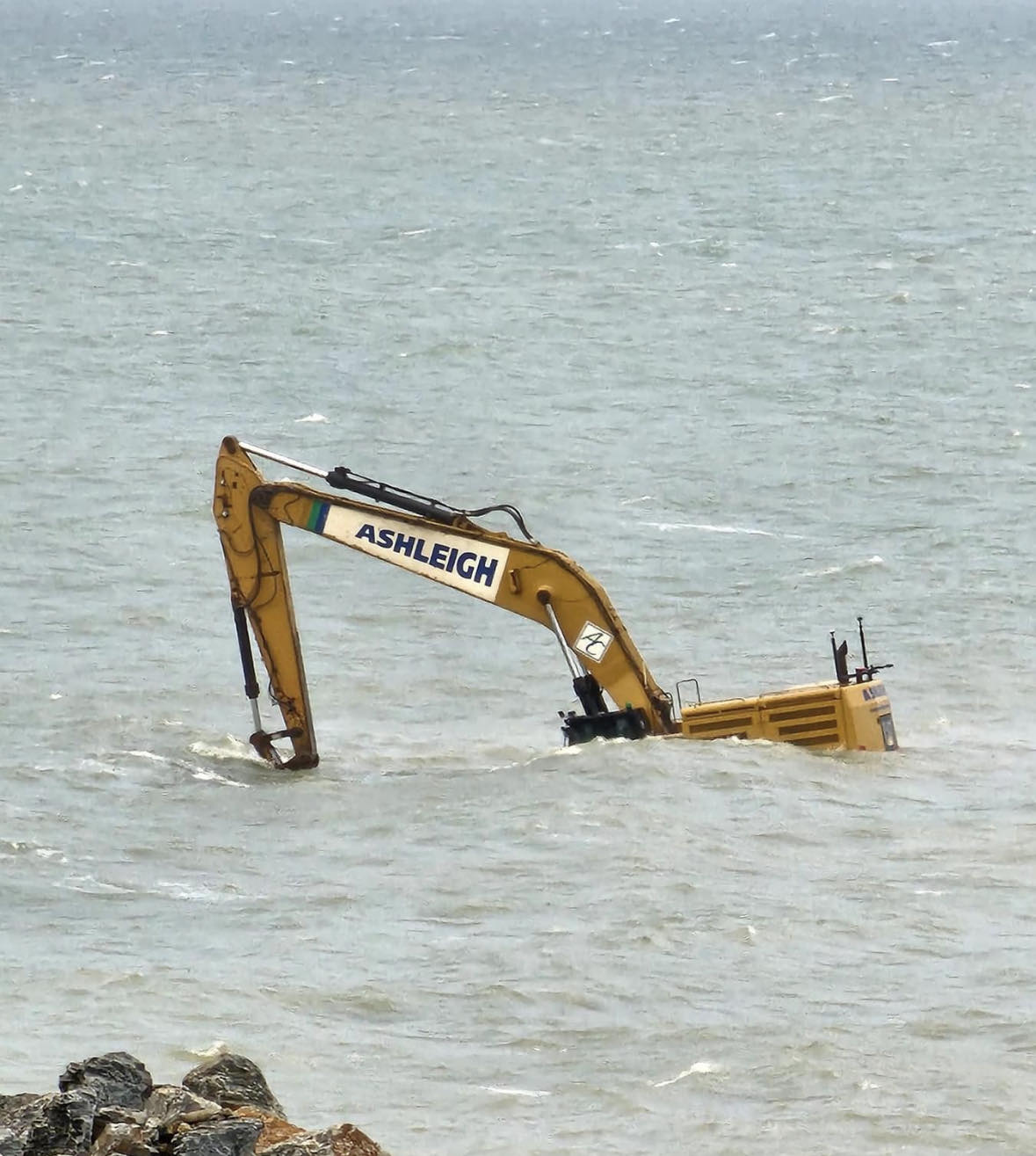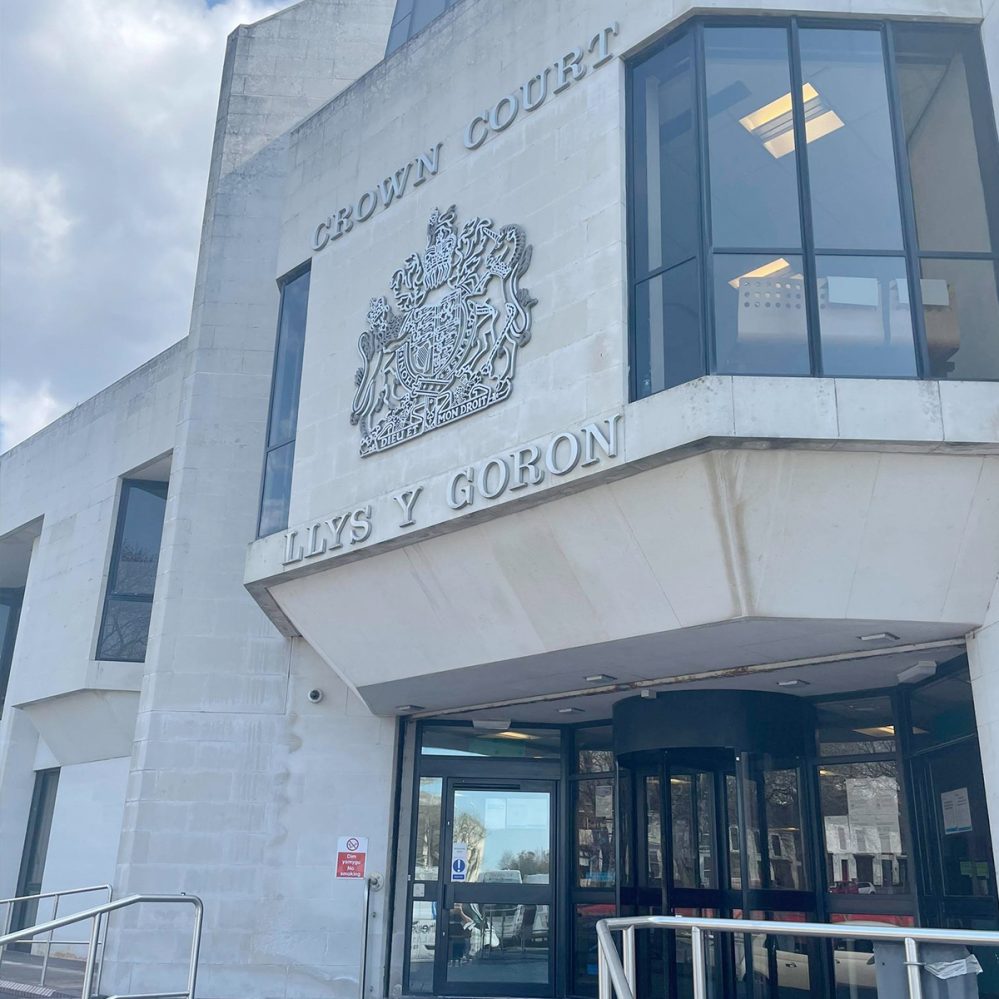News
Excavator stranded at sea during coastal defence work in Aberaeron

A £500,000 excavator involved in the £32 million Aberaeron Coastal Defence Scheme in Wales found itself stranded at sea after an unexpected electrical malfunction.
The incident occurred while the heavy machinery was being used to construct the outer extents of a rock breakwater during low tide.
According to Ceredigion Council, the malfunction occurred as the excavator, part of a fleet working on the coastal project, was engaged in its task.
Despite attempts to repair the fault before the tide came in, the efforts were unsuccessful. As a result, the excavator was left stranded and partially submerged as the tide rose, as captured in dramatic images by local photographer Matthew Cole.
In a statement, a spokeswoman for Ceredigion Council told Herald.Wales: “Efforts were made to repair the excavator prior to the tide turning, but unfortunately these were unsuccessful. Measures were then taken to isolate the electrics and seal all fluid tanks prior to the excavator becoming submerged, and also cap/secure any items where sea water could enter the machine.”
The council has informed Natural Resources Wales about the incident, and discussions are ongoing about how and when the excavator can be recovered from the water.
The Aberaeron Coastal Defence Scheme is a significant project aimed at protecting the Welsh town from coastal erosion and flooding. The works include the construction of a rock breakwater extending from North Pier, the refurbishment and rebuilding of South Pier’s head, the construction of flood walls, the installation of a flood gate at Pwll Cam inner harbour, and improvements to existing defences along South Beach
Crime
Cowboy builders jailed after years of bullying and fraud against homeowners

A FATHER and son who preyed on homeowners across south and west Wales — many of them elderly or in poor health — have been jailed after a court heard how they used intimidation and deception to extract huge sums of money for unnecessary and badly executed building work.
Jim Janes and his son, Thomas James, ran a long-running roofing scam that left dozens of victims facing financial hardship, unfinished homes and costly repair bills.
Swansea Crown Court heard the pair routinely targeted householders with minor repair needs before escalating jobs into major works, demanding ever-increasing payments once roofs had been stripped or damaged.
When questioned or challenged, the defendants became aggressive, leaving victims feeling frightened and pressured into paying. In one case, a homeowner was threatened unless money was handed over.
Passing sentence, Judge Catherine Richards said the defendants showed a “cruel disregard” for the impact of their actions and deliberately manipulated vulnerable people for financial gain.
She told the court the offending was driven by greed and a willingness to exploit those least able to protect themselves.
The court heard the fraud continued for more than five years, during which the defendants traded under multiple business names, changed contact details, and used different bank accounts in an effort to avoid detection.
Lee Reynolds, prosecuting, said the pair often dismantled roofs without consent and left properties exposed to the weather, effectively forcing customers to comply with their demands or face further damage to their homes.
Many victims were in their sixties, seventies and eighties, with some paying tens of thousands of pounds. One homeowner lost £100,000.
Independent experts later found that much of the additional work charged for was unnecessary and that the workmanship carried out was of poor quality. In some cases, jobs were left incomplete, requiring extensive remedial work.
Victims told the court how they had been left anxious, ashamed and financially stretched, with some forced to borrow money or remortgage their homes to cover the costs.
Jim Janes, 55, and Thomas Michael Jim James, 37, both of Llangadog, Carmarthenshire, had previously pleaded guilty to fraudulent trading.
In mitigation, the court heard Janes had worked in the building trade for much of his life, while James was said to have played a lesser role in the operation. However, the judge rejected claims that either man bore reduced responsibility.
Sentencing both men to eight years in prison, Judge Richards said they had acted ruthlessly and without any regard for the harm caused to their victims.
Both defendants will serve 40 per cent of their sentences in custody before being released on licence.
A further hearing will be held on Thursday (May 22) next year to consider confiscation proceedings and the imposition of serious crime prevention orders.
Crime
Cocaine dealers jailed after flooding Aberystwyth streets with drugs

TWO men who supplied cocaine in Aberystwyth have been jailed after police seized large amounts of cash, drugs and weapons during coordinated raids.
Luke Hutton, aged 25, and Lee Mark Walsh, 37, were sentenced at Swansea Crown Court after admitting possession of cocaine with intent to supply and possessing criminal property.
The court heard that police attended Walsh’s flat in Aberystwyth on Thursday (Nov 14) to execute a search warrant. Officers saw several people outside the address, including both defendants. When police approached, Walsh remained at the property while Hutton attempted to flee but was quickly detained.
Walsh, of Yr Hafan, Aberystwyth, was found with cannabis, £160 in cash and a mobile phone. Hutton, of Corporation Street, Aberystwyth, was carrying £8,795 in cash and a phone.
During a strip search in custody, officers recovered a wrap of white powder concealed on Hutton. Further searches uncovered £850 in cash laid out on Walsh’s bed, five mobile phones, a silver knuckleduster and a large kitchen knife hidden beneath the bed.
Police also recovered scales with white powder residue, a bank card contaminated with drug traces, and a further bag of white powder elsewhere in the flat. At Hutton’s address, officers found £1,060 in cash, bicarbonate of soda and empty snap-seal bags, consistent with drug preparation.
Prosecutor Dean Pulling told the court both men were clearly involved in drug supply for financial gain.
Walsh also admitted possession of an offensive weapon and possession of cannabis. He has previous convictions for cannabis offences and failing to comply with a drugs test.
Hutton has a longer record, including offences involving communications, driving matters, domestic abuse and breaching a restraining order.
Mitigating for Walsh, Ryan Bowen said the defendant had experienced a troubled childhood, moving schools frequently, and had struggled with cannabis use from a young age. He said Walsh had shown a strong work ethic and hoped to pursue barbering on release.
Jon Tarrant, representing Hutton, said his client had been heavily addicted to cocaine and that drug use had dominated his life, contributing to the breakdown of relationships, including contact with his two young children.
Sentencing, Judge Vanessa Francis said both men had been involved in dealing with the expectation of making “significant financial gain”.
Addressing Hutton, she said: “You told the author of the pre-sentence report that when your benefits stopped, you ‘did what you had to do’. This court will do what it has to do to take off the streets those who spread the misery of drug supply.”
After reductions for guilty pleas, Hutton was jailed for three years and Walsh for 32 months. Both will serve up to half of their sentences in custody before being released on licence.
Community
Crowds line streets as tractor run hailed a festive success

CROWDS lined streets and pavements across Pembrokeshire on Saturday evening (Dec 20) as Clarbeston Road AFC’s illuminated Christmas tractor run was hailed a resounding success.
More than 200 tractors took part in the event, travelling through villages and towns including Newmoat, Maenclochog, Llys-y-frân, Walton East, Clarbeston Road, Wiston, Newbridge, Poyston Cross, Crundale and Haverfordwest, where large crowds gathered to watch the festive convoy pass through.
Families, children and residents wrapped up against the cold to enjoy the sight of tractors decorated with Christmas lights and festive displays, with applause and waves greeting drivers as they made their way through built-up areas and rural roads alike.
The convoy set off from the Clarbeston Road AFC Knock Playing Fields at 5:30pm and concluded at the County Showground in Haverfordwest later in the evening. At the end of the run, refreshments were available and the raffle draw took place at the Park House building, which was open to the public.
Organisers said the turnout from both drivers and spectators exceeded expectations, with the event once again bringing communities together while raising funds for local causes, including The Catrin Vaughan Foundation, In It With Isaac, and Wales Air Ambulance.
Clarbeston Road AFC thanked tractor drivers, volunteers, sponsors and members of the public for their support, as well as residents and road users for their patience while the convoy passed through.
The illuminated tractor run has become a firm fixture in the local festive calendar, with Friday night’s event described by many spectators as one of the best yet.

-

 Crime3 days ago
Crime3 days agoMilford Haven man jailed after drunken attack on partner and police officers
-

 News6 days ago
News6 days agoDyfed-Powys Police launch major investigation after triple fatal crash
-

 Crime3 days ago
Crime3 days agoTeenager charged following rape allegation at Saundersfoot nightclub
-

 Crime4 days ago
Crime4 days agoMan charged with months of coercive control and assaults
-

 Crime5 days ago
Crime5 days agoMan sent to Crown Court over historic indecent assault allegations
-

 Crime5 days ago
Crime5 days agoMilford Haven man admits multiple offences after A477 incident
-

 Crime4 days ago
Crime4 days agoWoman ‘terrified in own home’ after ex breaches court order
-

 Crime6 days ago
Crime6 days agoTrefin dog case ends in forfeiture order after protection notice breach





















